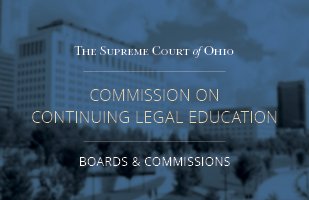Continuing Legal Education: Enhancing Lawyer and Judge Knowledge

The Commission on Continuing Legal Education regulates education requirements for judge and attorneys,

The Commission on Continuing Legal Education regulates education requirements for judge and attorneys,
Editor’s Note: This story is part of a series on the Ohio Supreme Court’s boards and commissions.
As the legal landscape constantly evolves, so does the need for lawyers and judges to keep up with change.
The group dedicated to regulating the requirements for the ongoing education of the state’s judges and lawyers is the Ohio Supreme Court’s Commission on Continuing Legal Education.
“The commission makes recommendations on rule amendments and changes routinely, while also accrediting programs and activities required for continuing legal education,” said Gina Palmer, the commission’s secretary and director of the Office of Attorney Services at the Supreme Court.
What is CLE?The purpose of continuing legal education (CLE) is to maintain and improve the quality of legal and judicial services in Ohio.
Rule X of the Supreme Court Rules for the Government of the Bar of Ohio and Rule IV of the Rules for the Government of the Judiciary of Ohio require attorneys, judges and magistrates to complete a minimum of CLE credit hours within a two-year compliance period: 24 hours for attorneys and 40 hours for judges and magistrates.
The credits can be earned by attending or teaching CLE courses, taking or teaching law school classes, publishing a law article or book, or providing pro bono legal services through an accredited provider.
Attorneys and judges who fail to complete the CLE requirements by their deadline or during a late compliance period face sanctions ranging from $75 to a suspended law license.
On average, Palmer says, 1,300 of the state’s more than 44,000 lawyers aren’t initially in compliance with the Dec. 31 deadline and approximately 200 of those fail the late compliance date and are sanctioned by the commission.
CLE ApprovalWhile individual judge and lawyer compliance is an important responsibility for the CLE Commission, its most voluminous duty is approving education programs and activities that satisfy Ohio’s mandatory CLE requirements.
Last year, the commission processed 24,000 applications. The Office of Attorney Services reviews the content and technical requirements necessary for approval.
If an application is denied, the Office of Attorney Services can work with the applicant and the commission to resolve the issues during an appeal.
“We work hard with the sponsors to get it approved,” Palmer said. “It takes more work, but the sponsors – bar associations and law firms – get better and get more activities approved.”
Under normal circumstances, but especially during the global pandemic, the commissioners’ influence in improving CLE options occurs by analyzing and recommending amendments to statewide rules.
For example, to aid in the shortage of poll workers during the pandemic last year, the commission recommended, and the Court granted, a temporary order allowing lawyers and judges to receive CLE credit by serving as poll workers during the primary and general elections.
Prior to COVID-19, the Office of Attorney Services was mainly a paper-based operation. The necessity of teleworking to limit the spread of the virus required the department to create online processes for CLE applications and late compliance payments to the Supreme Court.
“With everyone in Attorney Services largely working from home for several months, we had to come up with some other way for people to get applications and payments to us,” Palmer said.
Commission CompositionThe group has 19 members with representation from throughout Ohio and in various capacities. The appointments include 12 lawyers – one each from the 12 appellate districts; five judges; a law school dean or faculty member; and a non-attorney.
Representatives serve three-year terms and can be reappointed once.
Meetings occur four times a year, including two in the fall when commissioners sort through hundreds of CLE sanctions that weren’t fulfilled during the late-compliance period, which allows attorneys to make up insufficient hours.
Service on the Commission of Continuing Legal Education is one of the many ways an attorney can give back to the profession. The Commission on Continuing Legal Education, like other boards and commissions, has a need for volunteers to share in maintaining the integrity of the profession. The justices of the Ohio Supreme Court appoint the members of the board and are always grateful for applications from those willing to serve.


